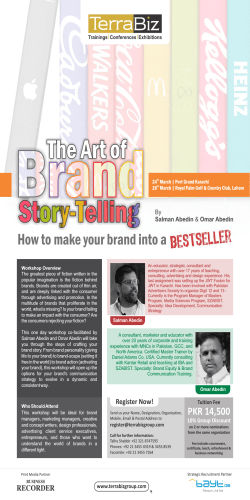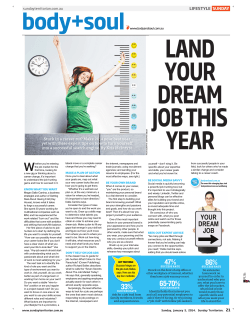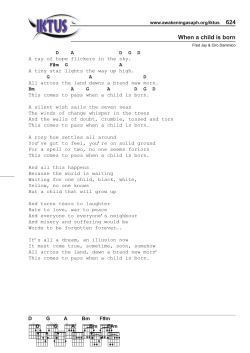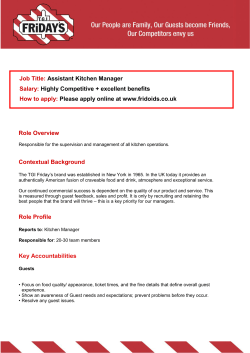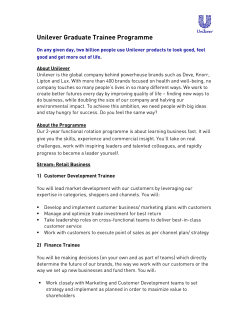
ASIA TOOLKIT 2012 (SAMPLE VERSION) WARC TRENDS
WARC TRENDS ASIA TOOLKIT 2012 (SAMPLE VERSION) >> How leading brands are rising to the Asian challenge © Copyright Warc 2012. All rights reserved. Published: August 2012 Warc Trends >> Asia Toolkit 2012 Executive summary This is a sample version of Warc’s Asia Toolkit 2012 Trend Report The full version is available from the Warc Store. W arc’s Asia Toolkit 2012 is a guide to the key challenges facing brands in Asia. It identifies trends relevant to brand owners and agencies across the region, looks at why they are important, and demonstrates how leading brands are responding to them. This report builds on the global 2012 Toolkit report Warc launched at the start of the year. It has been edited, revised and updated to focus on trends relevant to Asian brands, using Asian data and case studies. Economic growth in ‘emerging’ Asia – China and India, plus fastgrowth economies such as Indonesia – means the region is now a priority for multinational comapanies. But the dynamism of the market leads to a number of challenges. For a start, markets like China and India are no longer ‘new’. Their big cities are cosmopolitan hubs full of sophisticated consumers. Increasingly, growth will come from beyond the major cities, in smaller towns and rural areas. Winning over these ‘new consumers’, who may be coming into product categories for the first time, is key to brand growth. Adidas in China is a good example; it has developed a strategy specifically for © Copyright Warc 2012. All rights reserved. Maybelline saw success in China Shangri-La used cultural insight lower tiers. Many of the lessons from China and India will apply to Indonesia and other markets full of newly created middle-classes. Many brand owners have concluded that they require new ways of working to meet these challenges. The ‘glocal’ model of a global brand idea handed down from headquarters for local interpretation is being replaced by something more subtle. PepsiCo, for example, uses India to experiment with new ideas, then looks for similar markets they can be applied in. Maybelline launched a successful BB Cream in China, then reapplied the concept in markets around the world. This is a world abundant in opportunity, if we know how to navigate it Indra Nooyi, Chairman and CEO, PepsiCo Cultural understanding Local relevance requires better insight. A growing number of cases from Asia show efforts to develop a deeper understanding of cultures in Asia and apply the findings to brands. Shangri-La is an example of a brand that started with the cultural context of its brand and developed an idea around it. As in most parts of the world, Asia has seen explosive growth in digital channels. The communications possibilities have grown exponentially. www.warc.com Warc Trends >> Asia Toolkit 2012 Executive summary (continued) This is a sample version of Warc’s Asia Toolkit 2012 Trend Report The full version is available from the Warc Store. So how should a brand navigate this complexity, and what does ‘integration’ mean when there are so many channels available? The answer may be ‘orchestration’; this approach requires a core brand idea that can be interpreted in different ways in different media. This allows media to play to their strengths, rather than force a ‘matching luggage’ approach onto diverse channels. Johnnie Walker is a good example of a brand that understands this in Asia. Nokia is one brand with a content straegy to generate that content. Sponsorship is growing into a big business in Asia (Chapter 7), though measuring its effectiveness remains difficult. The key is not just the ‘fit’ between the brand and the property, but the sophistication of the activation. A great example is Hero Honda’s sponsorship of hockey in India; the partnership helped to revive the sport and generate interest in the brand. The report concludes with a look at advertising expenditure trends around the region (Chapter 8). The headline trends are across-the-board rises in TV and online spend, with patchier performance among other media. Despite global economic volatility, Asia as a whole continues to grow as an advertising market. For both home-grown and international brands, the challenge is getting the most out of these budgets in a fast-moving market. The Asia Toolkit, it is hoped, will inspire them to meet this challenge. Social by design Social media throws up fresh challenges: how best to use it, and how to measure it. There is a growing realisation that communications strategies need to be ‘social by design’. That means planning for online word-of-mouth, and what a brand will do with it, from the start. The rise of social has led many brands to see themselves as content producers. The ‘brand journalism’ trend is particularly evident in Asia, with brands such as Nokia, Nissan and IBM using sophisticated content strategies. Sponsorship, either of events or sports properties, can be a good way © Copyright Warc 2012. All rights reserved. www.warc.com This is a sample version of Warc’s Asia Toolkit 2012 Trend Report The full version is available from the Warc Store. SAMPLE CHAPTER ASIA’S NETWORKED CONSUMERS >> How should brands respond to the explosion of social media in Asia? © Copyright Warc 2012. All rights reserved. Warc Trends >> Asia Toolkit 2012 At a glance Using social media This is a sample version of Warc’s Asia Toolkit 2012 Trend Report The full version is available from the Warc Store. KEY INSIGHTS 1 Social has many uses, and metrics will vary accordingly. It is often used to ‘amplify’ work in other media, but reach alone may be a poor guide to social media effectiveness. 2 C ampaigns from Mercedes and Intel/ Dell have shown the potential of social commerce in Asia. 3 nline word-of-mouth is particularly O powerful in China, and luxury brands have used this to their advantage. 4 A campaign by Philips in Indonesia showed that Twitter could be the basis of a sales-driving campaign in an emerging market. © Copyright Warc 2012. All rights reserved. People are always looking for ways to show the uniqueness in themselves. Stephanie Gan, Manager of Advertising and Digital Programs, Intel www.warc.com Warc Trends >> Asia Toolkit 2012 Making friends with social This is a sample version of Warc’s Asia Toolkit 2012 Trend Report The full version is available from the Warc Store. The growth of social sites such as Facebook or China’s Sina Weibo has been astonishing. The question for marketers is how to use them. Much has been written about social ROI – calculating the value of a Facebook fan, for example. That’s not surprising, as brands have been racing to accumulate social media followings. But there are no catch-all metrics for social; the measures used should depend on a brand’s objectives in using it. Some brands want to use social for reach – pushing content to followers and hoping it is shared. In this way it can be used to ‘amplify’ work in other media – a good example is the way Vodafone in India built on the success of the Zoozoo characters. Others have used social as a standalone brand-building medium. An example is Intel’s ‘Museum of me’, which allowed people to turn their Facebook profiles into videos. The campaign launched in Asia but spread virally around the world. Social can be a community tool, allowing brands to reward followers with offers or experiences. And for PR practitioners, it can be a crisismanagement tool. © Copyright Warc 2012. All rights reserved. A common approach to social is to encourage consumers to recommend or share a brand’s message. A current trend is ‘social by design’, where planning for WOM or recommendations is not a bolt-on, but a programme’s central purpose. Intel’s ‘Museum of me’ spread virally from Asia; Vodafone used social to amplify work featuring its Zoozoo characters in India Asia also has good examples of social commerce. Group-buying is big in China, and Mercedes-Benz boosted Smart car sales by 106% after a group-buying offer. And Singapore was the venue for Intel and Dell’s ‘Swarm’ campaign, which let consumers band together to get cheaper prices. Social by design strategies This is an idea that companies such as Facebook are very keen to push. Indeed, Facebook’s recent initiatives, such as Timeline and Open Graph, are designed to change the way people discover content and receive recommendations. If brands aim to be ‘social by design’, Facebook wants to be the tool of choice. Online WOM arguably has greater influence in Asia than in the West. China is a good example: there are low levels of trust in official information sources; also, the one-child policy means smaller families, giving virtual networks greater power. Several studies have looked into Chinese WOM strategies. GroupM and CIC conducted an in-depth study into how luxury brands were driving online recommendations on platforms such as Sina Weibo. Burberry was identified as a brand that used these platforms well. www.warc.com Warc Trends >> Asia Toolkit 2012 The rise and rise of the social giants This is a sample version of Warc’s Asia Toolkit 2012 Trend Report The full version is available from the Warc Store. SOCIAL MEDIA IN ASIA KEY FACTS Facebook took time to establish Facebook’s top-five Asian markets (millions of users) 45.0 itself in Asia (Friendster and Orkut were popular in many markets for several years). However, it is now the dominant social network, with Indians and Indonesians in particular taking to the service. 43.5 27.7 14.2 India Indonesia Philippines here is still huge potential for T growth – penetration in both the top two markets is below 20%. 12.4 Thailand Malaysia Source: Source: Socialbakers (as of April 2012) Most talked-about brands on Sina Weibo (number of tweets) 13,213 In China, weibo (microblogs) have become the lead social networking medium, with 300 million people signed up. Sina Weibo is the dominant platform. study of brand mentions on A Sina Weibo found that Apple was by some distance the most talked-about brand. 2,018 Apple 1,584 McDonald’s Chanel 1,518 1,314 1,260 964 928 865 852 KFC Nokia BMW LV Nike Sony HTC Source: GroupM/CIC (2000 youth sample, Jan-Jun 2011), quoted on Warc © Copyright Warc 2012. All rights reserved. www.warc.com Warc Trends >> Asia Toolkit 2012 Case study Philips This is a sample version of Warc’s Asia Toolkit 2012 Trend Report The full version is available from the Warc Store. An Indonesian Twitter-based campaign showed how powerful social media can be as a marketing tool in Asia’s fast-growth markets. Campaign Semangat Advertiser Philips CHALLENGE Indonesia’s huge population and growing purchasing power make it one of the most appealing markets for electronic goods makers. Philips, which was known as a lighting brand in the market, wanted to extend into healthcare and lifestyle. It invested in a revamped website in Indonesia, but few people visited it because the brand was simply being out-advertised by South Korean producers. Philips needed to boost website traffic, and from there lift sales. SOLUTION Twitter has gained a huge following in Indonesia, which according to some reports is the world’s most Twitter-addicted market. As a result, Philips decided to use Twitter as the basis of a social commerce initiative. The hook was the new year celebration, and Philips challenged Indonesians to tweet (using the hashtag #semangat2011) about the things they aspired to do to improve © Copyright Warc 2012. All rights reserved. Agency DDB Singapore Market Indonesia Source Warc Prize for Asian Strategy, 2011 their health and well-being over the coming 12 months. Products available for ‘sale’ depended on the number of tweets and retweets made. As the number of tweets grew, Philips would unlock a product of increasing value. The person with the highest number of retweets could ‘purchase’ the product by paying in tweets. Conversations were also seeded into social platforms, such as Indonesia’s most popular forum, Kaskus, and the Facebook page of Philips Lighting. RESULTS The campaign was able to deliver the desired boost to the Philips website, with a 45% increase in visits, and nearly 13,000 contest submissions were made. The surge in interest led to a rise in sales, with Philips exceeding its sales targets. www.warc.com Warc Trends >> Asia Toolkit 2012 Implications Better social strategies This is a sample version of Warc’s Asia Toolkit 2012 Trend Report The full version is available from the Warc Store. 1 2 3 4 BE ‘SOCIAL BY DESIGN’ The ‘social by design’ trend means planning for recommendations and sharing from the outset – that means making it easy for consumers to pass on content if they enjoy it (and sometimes even rewarding them for doing so). However, it’s important that budgets are focused on building sharable content and programmes, rather than on building fanbases. Fans or followers have little value unless there is a plan to use them. STAY RELEVANT The Philips Semangat campaign in Indonesia showed how brands could make use of major events (such as new year) as a hook for topical social campaigns. It is important to focus activity on events and ideas that are important to consumers, rather than using social media simply to push out company news. PLAN FOR THE METRICS MINEFIELD There is no single social ROI measure that can cover aims as varied as reach, loyalty and sales. And there is no sign of one being developed soon. Brands should vary metrics according to their objectives, and be realistic about the limitations of the data. TEST IN SOCIAL-CRAZY MARKETS While social channels have gained ground across Asia, they are particularly powerful in China and Indonesia. These markets may serve as useful testbeds for social strategies. © Copyright Warc 2012. All rights reserved. www.warc.com Warc Trends >> Asia Toolkit 2012 Read more in the full Asia Toolkit 2012 This is a sample version of Warc’s Asia Toolkit 2012 Trend Report The full version is available from the Warc Store. FEATURED CASE STUDIES 1 Contents 1 Intel, The Larger India, India 4 2 Maybelline, BB Kong, China 3 Cadbury, Shubh Aarambh, India 2 5 Asia’s new middle-classes Rethinking ‘glocal’ 3 Insight 5 Philips, Semangat, Indonesia 3 1 Consumers 2 Brand management 4 I-Lohas, Crush Eco, Japan 6 Nissan, Global Media Center, Japan Warc’s Asia Toolkit 2012 features eight chapters, focusing on key challenges and trends within Asian marketing. It looks at some of the biggest issues, and uses Warc’s insight and case studies to show how the best brands are rising to the challenge. Cultural connection 6 4 Integration Orchestration 5 Social media Asia’s networked consumers 6 Content 7 Hero Honda, Phir Dil Do Hockey Ko, India Brand journalism 7 Effectiveness 7 Return on sponsorship 8 Adspend Key investment trends © Copyright Warc 2012. All rights reserved. www.warc.com About Warc’s Asia Toolkit 2012 This report features eight chapters offering analysis, case studies and data. Find out the key challenges facing Asian brands, and discover how marketers are responding. Highlights: Identifies seven key trends in Asian marketing Real examples of how leading brands are meeting the challenges they face Includes data and case studies to support the argument Provides the latest adspend data and forecasts for key Asian markets The full report is available from the Warc Store. © Copyright Warc 2012. All rights reserved. www.warc.com More from Warc… IN THE WARC TRENDS SERIES CONTACT US MOBILE MARKETING Warc’s report on the latest trends in mobile marketing. Includes case studies and data showing how consumers and brands are using mobile. WARC TRENDS MOBILE MARKETING . >> Find the right mobile strategy for your brand Available from the Warc Store © Copyright Warc 2012. All rights reserved. Published: May 2012 WARC TRENDS SHOPPER MARKETING >> Find the right shopper strategy for your brand SHOPPER MARKETING Warc’s report on the latest trends in shopper marketing. Includes case studies and data showing how advertisers are innovating along the customer journey. Available from the Warc Store © Copyright Warc 2012. All rights reserved. Published: June 2012 LONDON (HEAD OFFICE) 85 Newman Street London W1T 3EX United Kingdom +44 (0) 20 7467 8100 [email protected] SINGAPORE 20A Teck Lim Road Singapore 088391 +65 3157 6200 [email protected] WASHINGTON DC 2233 Wisconsin Ave NW Suite 535 Washington, DC 20007 United States +1 202 778 0680 [email protected] FOLLOW US © Copyright Warc 2012. All rights reserved. www.warc.com
© Copyright 2026


